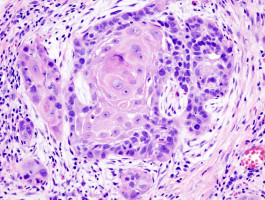
High levels of circ E7 by quantitative RT-PCR predicted improved overall survival in ASCC and analysis of The Cancer Genome Atlas sequencing from HPV-positive head and neck cancer and cervical cancer suggested high circ E7 marked improved survival in 875 subjects.
While the research team's study suggests that circ E7 levels correlate with improved survival in ASCC, larger, prospective studies are necessary to confirm the potential role of circ E7 as a biomarker.
Dr. Richard C. Wang from the Department of Dermatology, UT Southwestern Medical Center, Dallas, 75390, TX, USA as well as ProPath Dermatopathology, Dallas, 75247, TX, USA said, "Anal Squamous Cell Carcinoma has 30,000 new cases diagnosed annually worldwide and the incidence is rising by 2% each year."
The most effective treatment for advanced locoregional or metastatic ASCC is Mitomycin C and 5-Fluorouracil or Cisplatin with concurrent radiotherapy, known as the Nigro Protocol.
Surgical excision may be employed yet 30% of cases do not respond or relapse locally.
HPV-driven cancers such as head and neck squamous cell cancers show an over-expression of GLUT1 but the relationship between HPV and the GLUT1 transporter has never been explored in ASCC.
Due to the development of ASCC from keratinocytes and the high incidence of HPV, the expression of this transporter should be explored in the context of ASCC and HPV infection.
High-risk human papillomaviruses, especially HPV16, is implicated in 70-90% of cases of ASCC and is a primary driver of oncogenesis.
The authors identify high levels of circ E7 as a positive prognostic marker in ASCC, and potentially other HPV-driven cancers.
The Wang Research Team concluded, "Larger, prospective studies are recommended to analyse the role of circ E7 roles in HPV-driven cancers."
Source: Impact Journals LLC
The World Cancer Declaration recognises that to make major reductions in premature deaths, innovative education and training opportunities for healthcare workers in all disciplines of cancer control need to improve significantly.
ecancer plays a critical part in improving access to education for medical professionals.
Every day we help doctors, nurses, patients and their advocates to further their knowledge and improve the quality of care. Please make a donation to support our ongoing work.
Thank you for your support.